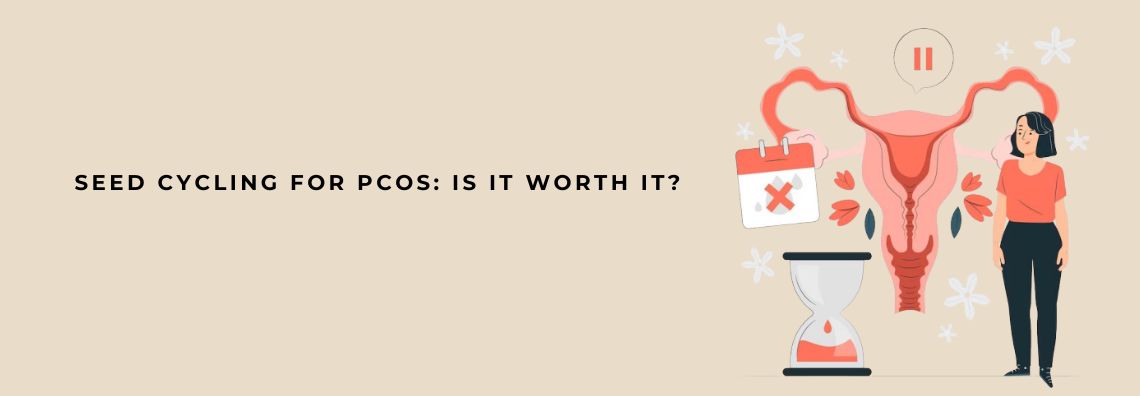
Hormones are a fundamental factor in the systematic functioning of the human body and play an important role in the reproduction system of humans. The female reproductive system and the menstrual cycle are highly affected by hormones and any disturbance in the delicate balance of the hormones can lead to fertility issues.
Hormonal imbalance is the most common reason behind infertility among women. Although advanced medicine can treat hormonal imbalances, holistic methods are proven to treat and heal the endocrine system. Seed cycling is one of the holistic approaches.
What Is Seed Cycling?
Seed cu=ycling is an ancient practice that involves consuming specific seeds during different phases of the menstrual cycle. This helps in balancing hormones. Understand the different phases here:
Phase 1
One tablespoon each of raw, ground flax and pumpkin seeds per day. Start eating these from the first day of your period until the day before ovulation.
Phase 2
Consume one tablespoon each of raw, ground sunflower and sesame seeds per day from the day of ovulation until the day before your period.
How Does Seed Cycling Come To Effect?
Eating specific seeds at different times can help balance hormones and improve fertility. Here is how you can make it effective:
Eat Different Seeds at Different Times
During the first half of the menstrual cycle, women should eat seeds that support estrogen production, like flax and pumpkin seeds. During the second half, eat seeds that support progesterone production, like sunflower and sesame seeds.
Consume Raw Seeds
Seeds should be raw, freshly ground and ideally soaked to eliminate anti-nutritional factors. Add them to smoothies, salads, soups or make a seed mixture.
Follow a 14-day Cycle
Follow a 14-day cycle for each phase. 1-2 tablespoons of flax, sunflower and sesame seeds will be enough. You can ask a PCOS specialist for advice.
Seed Cycling Benefits For PCOS: Is It Worth It?
Polycystic Ovary Syndrome (PCOS) is a common hormonal disorder among women. This happens partially in women’s reproductive years. It can cause irregular menstrual cycles, excessive hormone levels and ovarian cysts.
PCOS is often responsible for weight gain, acne, hair thinning and difficulty getting pregnant. If you want to manage PCOS, you need to make lifestyle changes, medication and dietary improvements. Seed cycling can cooperate with improving symptoms of PCOS.
Seed cycling is a natural dietary approach and involves eating different seeds at different phases of the menstrual cycle to help balance hormones. Here are several benefits of seed cycling for PCOS:
Support For Ovulation
Regular ovulation can be difficult for people with PCOS. Seed cycling can help in improving hormonal balance and create a better environment for hormones and it can improve ovulation patterns. Flax and pumpkin seeds are high in omega-3 fatty acids and can support the production of estrogen, while sunflower and sesame seeds help boost progesterone.
Balance Hormones
Seed cycling can target hormonal imbalances and improve the regulation of estrogen and progesterone hormones. It can promote menstrual regulation and enhance fertility. Hormonal balance is important for women’s fertility.
Improved Insulin Senstivity
Insulin resistance is often experienced by women with PCOS. Seeds like flax, contain fubar and may help improve insulin senstivity. It supports better blood sugar control and weight management.
Reduce Inflammation
Chronic inflammation is a common complaint from women with PCOS and it can contribute to symptoms like acne and weight gain. Flaxseed and pumpkin seeds are rich in anti-inflammatory omega-3 fatty acids. It may help you reduce inflammation and improve overall skin health.
Natural Approach
Seed cycling is a natural approach and non-invasive treatment. It addresses a hormonal imbalance without causing harm to your body and menstrual cycle. It is easy to make part of your routine and requires only the addition of specific seeds in your meals, smoothies or snacks.
Seed cycling offers promising results and is the natural method to manage hormonal imbalances. It supports reproductive health and its effectiveness may vary from individual to individual. Although scientific research is limited to seed cycling, many women reported improvements in their PCOS symptoms to their PCOS specialists.
Conclusion
Seed cycling should be considered a part of a broader lifestyle approach and should be included in a healthy diet, regular exercise and if needed, as per your situation, medical treatment. Seed cycling is safe and natural, you must contact a dietary specialist or your healthcare provider before adopting it in your routine.
Although seed cycling research is limited, many women found improvements in their PCOS symptoms. Seed cycling is a natural approach and a non-invasive procedure so people find it comfortable to add it to their routine. A slight change in day-to-day activities and some dietary changes can help see improvements.